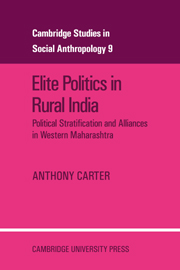 Elite Politics in Rural India
Elite Politics in Rural India Book contents
- Frontmatter
- Contents
- List of illustrations
- Acknowledgement
- Part I Introduction
- Part 2 Aspects of political stratification
- Part 3 Political alliances
- 7 Vertical alliances
- 8 Horizontal alliances
- 9 Alliances and political stratification
- 10 Conclusions
- Map of main Girvi settlement area
- Appendix
- Notes
- References
- Index
7 - Vertical alliances
from Part 3 - Political alliances
Published online by Cambridge University Press: 02 March 2010
- Frontmatter
- Contents
- List of illustrations
- Acknowledgement
- Part I Introduction
- Part 2 Aspects of political stratification
- Part 3 Political alliances
- 7 Vertical alliances
- 8 Horizontal alliances
- 9 Alliances and political stratification
- 10 Conclusions
- Map of main Girvi settlement area
- Appendix
- Notes
- References
- Index
Summary
In this and the two subsequent chapters I will analyse the political action which I observed in Girvi, Phaltan Taluka, and Satara District between February 1966, when I went to live in Girvi, and September 1967. This was a hectic period in local politics. In Girvi a new Panchayat was elected early in 1966 and a new Credit Society Managing Committee was elected later in the same year. A General Election was held throughout India in January 1967 and in Maharashtra there were zilla parishad and panchayat samiti elections in May 1967. More than half of the villages in Phaltan Taluka elected new panchayats in April 1967 and in Phaltan a new Municipal Council was elected in May 1967. I will not attempt to narrate the political history of this period. Rather I will show how the pattern of political aliances which emerged in these elections and in connected events is related to the social structure of the region and to the arenas and occasions of political action.
Decisions concerning political alliances are made in terms of such antecedent structural frameworks as the governmental and administrative systems, the caste system, the economic system, and the kinship system. An analysis of these systems in Western Maharashtra reveals a fifth and fundamental structural framework which runs through all the others. This structural framework is the division of the population into two categories: the mass of the population with little or no political influence and a small political class consisting mainly of potentially influential, high status, well connected, and wealthy v∂t∂ndar Marathas.
- Type
- Chapter
- Information
- Elite Politics in Rural IndiaPolitical Stratification and Political Alliances in Western Maharashtra, pp. 101 - 126Publisher: Cambridge University PressPrint publication year: 1974
